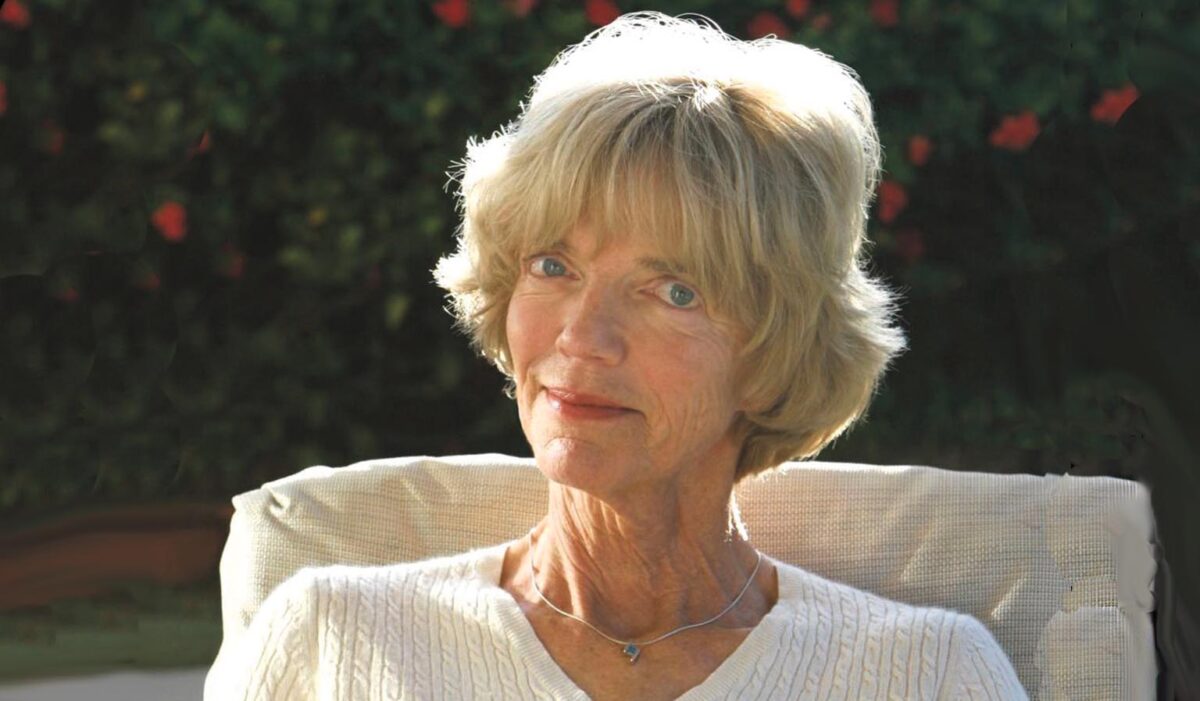
The Basement Gym + Studio opens in Camden Town
Camdenist readers get 50% off their first month’s membership, too

The world’s largest festival of philosophy and music is returning to Kenwood House, 18-19 September.
Camdenist readers get 20% OFF the price of all tickets. Just uses the code CAMDENIST20 at the checkout and we’ll see you there.
How do we know things? How do we remember them? How do we learn spatial layouts? Why do we feel things? How is it that we have strong attachments to others? What is the nature of that emotion? Is it something that lizards feel too? What happens when we sleep? What about if we’re in a coma?
These are the kinds of questions neurophilosopher Patricia Churchland is interested in answering. “If I was asking these things say 100 years ago, I’d just have to sit in my armchair and wonder. Today we know so much more thanks to developments in brain science, and I find that pretty intriguing.” Patricia coined the term ‘neurophilosophy’ in the 1980s to describe the overlap between neuroscience and philosophy or, as she articulates it, “the inevitable melding of disciplines.”
Originally trained in analytic philosophy, it dawned on Patricia in graduate school that she didn’t just want to know about the meaning of a word but the phenomenon itself. “You can talk about the word ‘knowledge’ until the cows come home but what I want to know is how it is that brains know stuff. I think that the philosophy I was trained on wasted vast amounts of time arguing over ‘smart moves’ about word meanings.”
She describes how there were very few women around. Instead, she found herself surrounded by what she refers to as chest-puffed-out guys. She grins, “they thought that the best thing in the world was putting down the other guy in a debate with a quick and funny retort.” Thankfully the field has changed considerably in the last decade or so. “Younger people want to know what the science says about the questions they are interested in. If you’re interested in the ultimate nature of reality but you know no physics, that ain’t going to cut it anymore. If you’re interested in the nature of life itself, but you don’t know anything about DNA, or molecular biology, you’re doomed. Who’s going to listen to such a person? I think the same is true of consciousness. As we’re beginning to learn more about brain mechanisms, those people who speculate that “everything can be conscious: protons, cow pats, everything!” You just think oh man, really? Under anaesthesia, cortical spiking of neurons falls by 90%. I am reasonably sure that neither protons nor cow pats have neurons or lose consciousness under anaesthesia!”
Both Patricia and her husband Paul are neurophilosophers, and their children both neuroscientists. She describes her relationship with Paul as a meeting of minds. “We can talk about anything and everything and figure stuff out together. That was something very special and remarkable and it still happens, even though now we’re pretty ancient!” She explains how her work has provided some objectivity on aging. “As I’m well into old age, there are things I’ve noticed that are different to how they were ten or fifteen years ago. It helps me to not think my spirit is just dissipating, but rather to understand these things in a neurobiological way.” The same is true of adolescence and puberty. “I think it would have helped as a teenager if somebody had explained to me how the brain changes due to hormones and why, consequently, your interests and your attitudes and the focus of your attention changes.”
The Churchlands are associated with eliminative materialism, the idea that as our understanding of brain processes develops, aspects of our vocabulary are going to change too. “Eliminative materialism got a bad rap, but our idea was really a lowkey one, in true Canadian style perhaps,” she laughs. “It’s turning out to be true, most spectacularly true in the case of memory. People once thought about ‘remembering’ as a single thing. Now we know that there are many different types of information storage, many different mechanisms that support learning and memory and that they can be dissociated.”
She describes how some people who have suffered brain damage to the hippocampal structures can learn to play a new game, like checkers, without remembering that they’ve ever learned it. Skill learning is possible for them, but not recollection of events. “Our vocabulary is shifting to recognise that there isn’t just ‘memory’ full stop, but that there are different kinds of memories supported by different kinds of brain structures. Eliminative materialism is really a modest point about a possible change in vocabulary as science proceeds.”
How does Patricia think our use of language will continue to change? Will philosophy eventually be rendered unnecessary as science progresses? “It’s hard to predict such things. Francis Crick and I used to talk a lot about predictions of progress and he’d say, “you really can’t make much of a prediction more than five years out.” He explained how, when he and Watson figured out the molecular structure of DNA, they couldn’t possibly have envisaged the uses and discoveries since.” With that kind of insight, she’s understandably hesitant to make predictions about the future of philosophy. “Nevertheless, I do think there will always be room for speculation about the nature of a certain kind of phenomenon, whether it’s a brain phenomenon, or an astronomical, molecular or atomic one.”
Patricia is particularly interested in the domain of sociality and how society shapes morality. But how do you investigate what morality means to social creatures whilst being a social creature? How can one escape the framework that the theory itself relies upon? She explains that scientists can interrupt or impair certain pathways in social mammals, such as rats and mice, that are crucial for sociality. “We know that oxytocin is very important, in both subcortical and cortical structures, for the formation of an attachment between parents and offspring. If you interrupt the secretion of oxytocin, then you can interrupt that social behaviour.”
In an important experiment, Allison Perkybile separated infant rats from their mother for a few hours each day, but kept them warm, healthy and fed. “What she noticed was that after the mice became adolescents and she measured their oxytocin levels, they were way down. Moreover, the density of oxytocin receptors, where the oxytocin binds on a neuron to have an effect was way down. When the female mice grew up, what were they like as mothers? They did not seem very attached to their babies.”
Another experiment involved injecting opioid drugs into mother mice or mother rats and seeing what the effects were on the offspring. The answer? “They’re much more attached to the drugs than they are to the babies. Not good. Or at least we feel it’s not good and I imagine the babies feel it’s not good! All mammals are social, some, such as humans, baboons and orcas, intensely so. Much of our brain plays a role in sociality. If the mechanisms and conditions for typical sociality go wrong, then typical social behaviour may be compromised.”
What has Patricia’s work taught her about humans? “One thing that is very striking about all mammalian and avian sociality, humans included, is the importance of those to whom we are attached. Most people are much more motivated to work for those in their own smallish community than to do something on behalf of an individual that they’ve never met who lives on the other side of the planet. When community breaks down, as it did in many small American towns after the factories closed, people were no longer coaching Little League baseball and going to church and having rummage sales and doing all those things that bring people together. The loss was palpable.”
For many of us, the pandemic has brought home the importance of community. “There have been discussions about the tremendously deleterious impact a lack of community can have on individuals who come to feel lonely and isolated. I think Covid has made people realise that it matters much more than philosophers might have thought, happily ensconced in their comfy common rooms.” Patricia expresses concern regarding some utilitarian scoffing at the demonstrable role of attachment in appropriate moral decisions. “I sometimes worry about utilitarians who think community and belonging are irrelevant in the moral domain. For example, a movement called ‘effective altruism’ insists that you owe as much to any human on the face of the planet as you do to those to whom you are attached. They argue that all that matters morally is size of need. Morality is a lot more complicated than that, and at its peril, the dictum runs roughshod over human nature. We care about those in our community that we know and recognize. We are motivated to help those to whom we are attached and we feel good when we do help. Evolution of sociality in mammals saw to it that this is so, by and large. Belonging is a crucial part of people’s emotional health. I tend to think effective altruism, in its claim that it is morally wrong to make attachment a relevant difference to whom you help, misses the wood for the trees.”
I ask Patricia what, on a more personal level, she has learnt from being alive. “I found that doing a lot of yoga is a really good thing for my brain and for my body. It gives my brain quiet time to settle down and quit being so noisy.” And is there a book that changed something for her? She describes how being born and raised in a poor farming community in the Okanagan Valley meant being practical from a young age. “We all had to develop common sense. We had to appreciate when you take risks and when you don’t, because often there’s nobody there to bail you out. One family decided to mortgage the farm to pay a faith healer to cure the father’s cancer. They lost everything. The lesson was not lost on the rest of us.”
Around the age of eight, somebody gave her ‘Anne of Green Gables’. “I probably read that book about ten times between the ages of eight and twelve. Anne’s independence and her way of dealing with difficulties and adversaries and problems and sadness and so forth had a big impact on me. But I think it would sound really stupid if, as a neurophilosopher, I said that the book that had the biggest impact on me was ‘Anne of Green Gables’. People will say “surely it should be Hume’s ‘Treatise on Human Understanding’, or Aristotle. So perhaps I should add that as a youngster I eavesdropped as my family and their friends frequently discussed biological evolution after dinner, my father always taking Darwin’s part. ‘The Origin of Species’ was a very big deal, bigger than the Bible.”
The world’s largest festival of philosophy and music is returning to Kenwood House, 18-19 September.
Camdenist readers get 20% OFF the price of all tickets. Just use the code CAMDENIST20 at the checkout and we’ll see you there.

Camdenist readers get 50% off their first month’s membership, too

A brand new hairdressing and barbering academy has landed in Camden Town and is now seeking style-conscious models and enthusiastic trainees

We speak to founder, Sol, about bringing the studio to Kentish Town

Explore the neighbourhood’s brand new neighbourhood